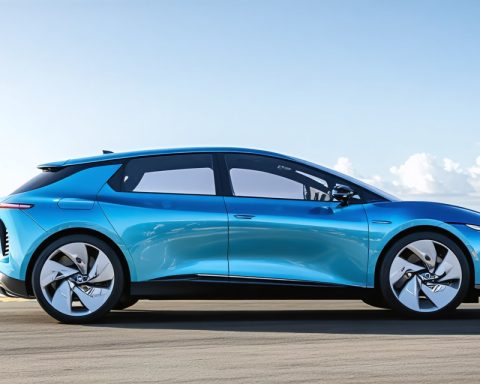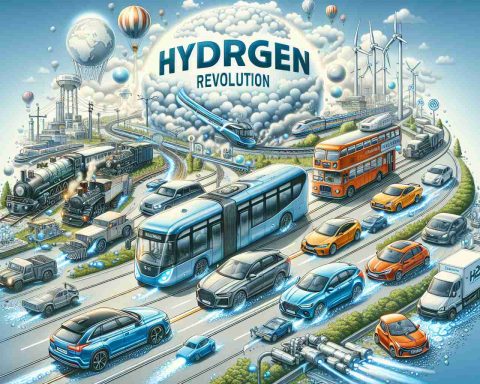Revolutionizing Hydrogen Production
Eternal Power’s recent non-binding offtake agreement, valued at €2.3 billion ($2.4 billion), showcases a significant surge in interest for its hydrogen production capabilities. The company’s Managing Director underlined the importance of this deal, distinguishing it from other less concrete agreements known as Memorandums of Understandings (MOUs).
Last year, Eternal Power made headlines by announcing plans to supply hydrogen to a yet-to-be-revealed partner in Germany. This strategic initiative will be centered at their production facility in Dummerstorf. Once operational, slated for 2028, the plant is expected to yield an impressive 9,000 tonnes of hydrogen annually.
The announcement marks a pivotal step in the energy sector, indicating strong backing for hydrogen as a viable alternative energy source. As global energy demands evolve, organizations like Eternal Power are stepping up to position themselves at the forefront of this transformation.
With projects like this on the horizon, the future of sustainable energy looks promising. The company’s ambitious plans signal not just growth for Eternal Power but also a transformative shift towards cleaner energy solutions that could redefine the landscape of energy production and consumption worldwide.
Hydrogen’s Potential: A Catalyst for Global Transformation
The burgeoning interest in hydrogen production, exemplified by Eternal Power’s substantial offtake agreement, underscores a broader trend that could reshape society and the global economy. As nations strive toward reducing carbon emissions and achieving energy independence, hydrogen is increasingly viewed as a cornerstone of sustainable energy strategies. The European Union, for instance, has committed to ambitious climate targets, with projections indicating that hydrogen could account for up to 13% of Europe’s energy consumption by 2050.
On a cultural level, the shift towards hydrogen reflects changing consumer attitudes, as people become more environmentally conscious and expect corporations to adopt cleaner practices. This transition is not merely a technological upgrade; it’s a societal movement towards sustainable living, impacting sectors ranging from transportation to manufacturing.
However, this transformation is not without its environmental implications. Hydrogen production, particularly through renewable methods such as electrolysis, presents an opportunity to significantly cut greenhouse gas emissions compared to fossil fuels. Yet, as production scales up, concerns about water usage and the sustainability of resource management must be addressed.
Looking ahead, the long-term significance of hydrogen is profound. Companies investing in hydrogen infrastructure are positioning themselves to lead in a future leaner on fossil fuels, and as more governments adopt policies favoring hydrogen, we are likely to see an acceleration in innovation and investment in this sector. In conclusion, the momentum surrounding hydrogen is not just a fleeting trend; it is a catalyst for creating a more sustainable, resilient global economy.
Unlocking the Future: How Eternal Power is Pioneering Hydrogen Production
Revolutionizing Hydrogen Production
Eternal Power is making waves in the energy sector with its groundbreaking initiatives in hydrogen production. The recent non-binding offtake agreement valued at €2.3 billion ($2.4 billion) exemplifies the growing demand for clean hydrogen as an energy source. This deal, distinct from typical Memorandums of Understanding (MOUs), emphasizes a concrete step toward substantial energy partnership and development.
Strategic Developments in Hydrogen Production
Last year, Eternal Power announced plans to supply hydrogen to a significant partner in Germany, which is set to be revealed soon. The focus is centered on a state-of-the-art production facility located in Dummerstorf. Once operational, projected for 2028, the facility is anticipated to generate an impressive 9,000 tonnes of hydrogen annually, positioning Eternal Power as a formidable player in the emerging hydrogen market.
Insights into Hydrogen as a Clean Energy Source
Hydrogen is increasingly recognized as a crucial component in the transition to sustainable energy. Its applications span various industries, including transportation, power generation, and industrial processes. The interest in hydrogen is driven by its potential to decarbonize sectors heavily reliant on fossil fuels. With emissions reduction goals becoming more stringent globally, companies like Eternal Power are at the forefront of this energy transformation.
Pros and Cons of Hydrogen Energy
Pros:
– Environmentally Friendly: When burned, hydrogen produces only water vapor, making it a clean alternative to traditional fossil fuels.
– Diverse Applications: Hydrogen can be used in various sectors, from fuel cells in vehicles to industrial applications.
– Energy Storage: Hydrogen can store surplus energy from renewable sources, providing a solution for energy storage challenges.
Cons:
– Infrastructure Needs: Significant investments in infrastructure are required for hydrogen production, storage, and distribution.
– Production Methods: Most hydrogen is currently produced from natural gas, which can negate the environmental benefits unless green methods are employed.
– Safety Concerns: Handling hydrogen requires careful safety measures due to its flammability and low ignition energy.
Market Trends and Future Predictions
The global hydrogen market is poised for exponential growth as companies pivot towards cleaner energy solutions. As per recent analyses, the hydrogen economy could be worth over $2.5 trillion by 2050, driven by increased governmental policies supporting green technologies and the decarbonization of industries.
Eternal Power’s initiatives align with this market trend, signifying a broader shift towards sustainable energy production. With various countries enhancing their focus on hydrogen strategies, the future looks promising not only for Eternal Power but also for a cleaner, greener energy landscape overall.
Limitations and Challenges Ahead
Despite the optimistic outlook, several challenges face the hydrogen sector:
– Cost Factors: The production and storage of hydrogen can be cost-intensive, and scaling up technologies to reduce these costs remains a significant challenge.
– Regulatory Hurdles: Different regulations across countries can create barriers to the international hydrogen market.
– Public Perception: Misunderstandings regarding safety and efficacy can hamper the adoption of hydrogen technologies.
Conclusion
Eternal Power is positioned to make a significant impact in the hydrogen production landscape. As demand for sustainable energy rises, the company’s venture in Germany could set new benchmarks in the energy sector. Innovations such as these are crucial in the quest for sustainable, clean energy, offering a glimpse into a future where hydrogen plays a pivotal role.
For more insights and developments concerning energy production, visit Eternal Power.














